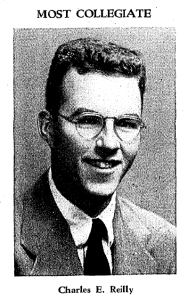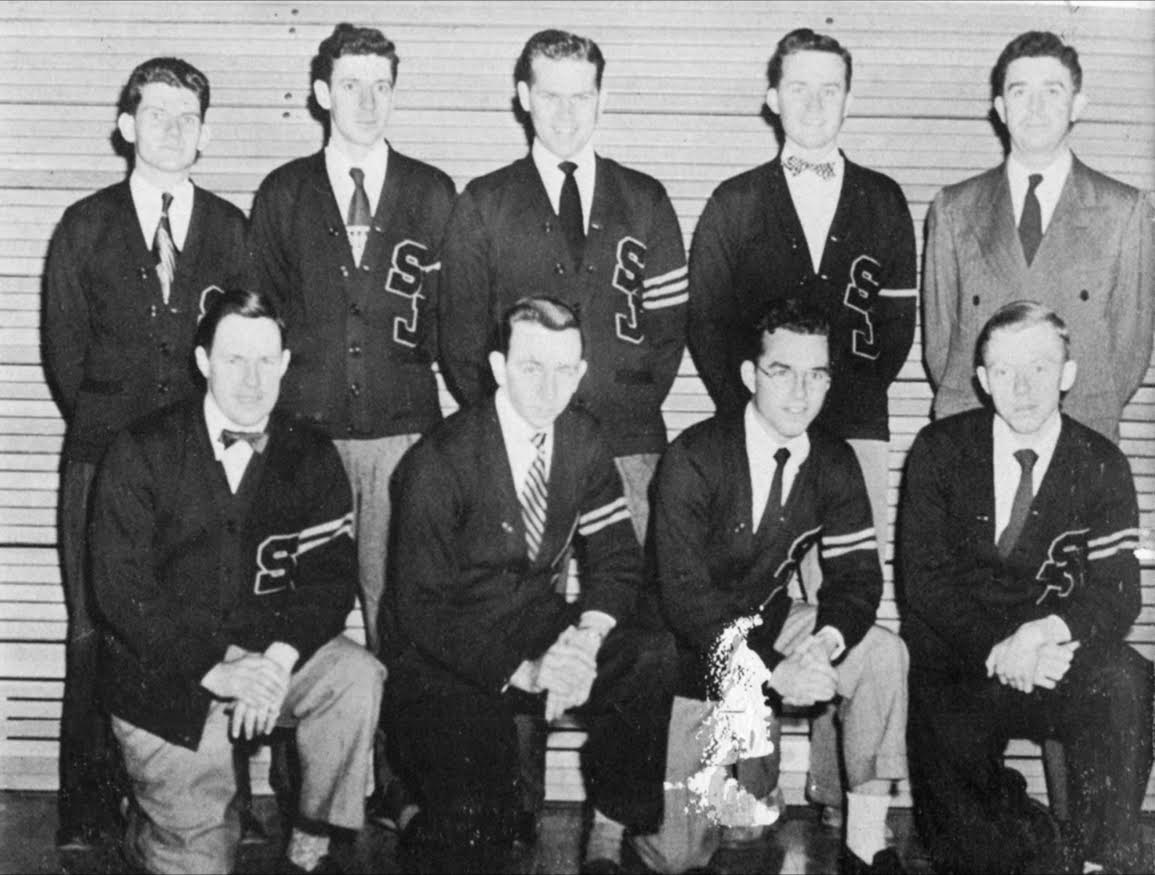St. Joe’s education shapes alumnus’ life
It was a sunny day outside the old field house, filled with high spirited men getting ready to graduate from St. Joseph’s College in May 1950. Charles Reilly, ’50, and his 504 fellow graduates lined up for a picture while proud parents watched their sons graduate.
70 years later, Reilly is now retired in Florida with four children, three stepchildren, 21 grandchildren and four great-grandchildren. He served in the Korean War, saw the Vietnam War, the assassination of John F. Kennedy, a man walk on the moon and the creation of the Internet.
Reilly’s oldest daughter, Lynn Marshall, describes him as effervescent.
“He’s just such an optimistic, bubbly, look-on-the-bright-side type of person,” Marshall said. “He’s smart of course and funny and very articulate, but really I think after he’s gone my main thought of him is going to be how he’s such a bright person.”
Reilly attended St. Joe’s before it became a university, commuting to campus every day from home.
“I lived on Bryn Mawr Ave., which was a five minute walk and there’s a lot to be said about going away to college, there’s a lot to be said about walking down the street to go to college,” Reilly said. “You know you can get out of bed late, you can sometimes slip back home, sneak out, get lunch, whatever.”
Reilly and his childhood friend Hugh Jones ’50 both lived in the same area and attended Lower Merion High School together before attending St. Joe’s.
“We lived on the same street,” Jones said. “He lived on Bryn Mawr Ave. in the back. The street over from Bryn Mawr was Hekamore Rd and there were six or seven houses and they all had boys in them, boys our age. We were living in a little adolescent universe.”

Back in October of 1946, the class of 1950 made up 63 percent of the total enrollment for the 1946-47 first term with 755 men altogether, the largest class St. Joe’s had seen, according to The Hawk. Out of that 63 percent, 561 were veterans leaving only 194 men who had not served in war and, according to Reilly, 19 of them were young men straight from high school.
Reilly and Jones were part of that small number who were straight out of high school.
“The thing that was different, you got these kids out of high school and then you’re a wash in the sea of military veterans, many of whom were married guys who have been shot at, so wearing a freshman dinky [cap] was not something that came easily to them, the vets,” Reilly said.
Jones found the experience of going to class with men who were much older than him to be educational and enlightening.
“It enlarged your perspective,” Jones said. “It provided some maturity, some awareness. As a senior in high school, you don’t really have a sense of what the world is about or what you’re growing into.”
Reilly studied business and has a Bachelor of Science in Business.
“In retrospect I probably would have taken journalism, but I took business thinking I’d probably go in the real estate business with my father and my grandfather,” Reilly said. “As it was, I turned out being a newspaper man and a writer. Journalism probably would have helped me more although I’m not complaining.”
Reilly’s favorite aspect of St. Joe’s was the Jesuit education and how it helped him not only in the classroom, but in everything he did.
“The thing in retrospect I most admire were the Jesuit priests that I had,” Reilly said. “I think they gave me the tools that guided me through adulthood. Their names are only history today, but they live on forever in the minds of the students. These guys were legends.”
Marshall said that she wishes she paid more attention to her father’s stories, but says that every time he spoke about his college years it was always in a positive light.

Captain Taney Willcox, Jack Quinn, Coach Mike Boland. Front row, from Left: Tom Rudolph, John Bateman, Charley Reilly, Tom Phelan.
“He thoroughly enjoyed his years there and he remembers being very active,” Marshall said. “He remembers fondly the people and the things that happened back then. He loved the tennis team, he loved anything that had to do with the sports there, but he really wished that one of us would go to St. Joe’s.”
About 16 days after Reilly and Jones’ graduation, President Truman ordered U.S. air and naval forces to South Korea.
“Everybody else was a vet and of course we never dreamed that we would ever be vets, but the Korean War broke out right after we graduated in 1950,” Reilly said. “So we went into service ourselves but that’s the big thing about my college years in the late ’40s.”
After the war both Reilly and Jones went to work in communications and worked for TV Guide, a bi-weekly magazine that provides television show listings and news about the shows.
“He [Reilly] was there for a while, but then he went off and did some other stuff and I stayed with the magazine and retired with the magazine,” Jones said. “I was with TV Guide for over 30 years. I couldn’t have gotten a job without my diploma from Saint Joseph’s.”
Reilly’s other communications jobs included working in Manhattan with advertising companies Young & Rubicam, J. Walter Thompson, Ogilvy & Mather and Hammond Farrell.
Reilly also founded the counseling firm InPerson Communications, established the first National Catholic Office for Radio and Television (NCORT) and was appointed by Pope Paul VI to be a consultant to the Vatican’s office to help arrange Communio et Progresso, the Holy See’s pastoral instruction on communications.
With all of these accomplishments in life, Reilly is most proud of his grandchildren.
“All this stuff about being listed and who’s who, or being in a hall of fame at the infantry school, they are all nice, but they are really not as important as knowing in your own heart that you made a difference, that you accomplished something for other people as well as yourself,” Reilly said.
Jones finds the Jesuit education vital because it requires the person to learn what is considered important.
“I learned how to distinguish the stuff and use it,” Jones said. “I don’t speak Spanish but I did learn the discipline of the foreign language. I have not spoken Spanish in years. I think St. Joe’s was a good value intellectually and societally.”
Reilly thinks that St. Joe’s helped him with his career because of the Jesuit education. “If you have been educated by the Jesuits, you automatically have a networking system,” Reilly said.
Both Reilly and Jones are proud to call themselves Hawks and will always remember their four years at St. Joe’s.
“The Hawk Will Never Die and there’s something about being a Hawk, it’s like being a Marine,” Reilly said. “Anybody that graduates from Saint Joseph’s University ought to think of that with a sense of pride. You know when you get that diploma, it stands for something and that something is good. It’s life enriching. And it’s like, to use another cliché, it’s like a St. Joe’s education is a gift that keeps on giving.”
Read Charles Reilly’s recollections of his years at St. Joe’s in the late 1940’s.












































